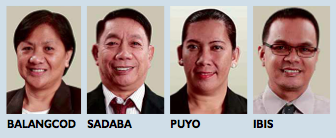More outstanding teachers to be honored Sept. 5
(Last of two parts)
Last week, we looked at six outstanding mathematics and English teachers who will be honored by Metrobank Foundation on Sept. 5 at Metrobank Plaza in Makati City.
Now let us look at the remaining four awardees, chosen through the foundation’s annual Search for Outstanding Teachers. These four teachers have dedicated their lives to various sciences and special education (SPED).
Chemistry
Noel V. Ibis of Vinzons Pilot High School in Vinzons, Camarines Norte province, has been teaching chemistry and educational psychology for 12 years.
He has created instructional materials for chemistry, such as work texts, intervention materials, games, even an innovative journal for research. Harnessing his psychology background, he has studied metacognition and conceptual understanding.
Ibis was born into a poor family. His father was a farmer-carpenter. At a young age, he sold food at the local market.
Finishing high school and college through scholarships, he decided to give back by pursuing a career in teaching.
A holder of a doctorate degree, Ibis says, “I not only impart factual knowledge to students but also teach them the values of optimism and determination,” which guided him when he was growing up.
Biology
Resureccion B. Sadaba of the University of the Philippines (UP) Visayas in Miag-ao, Iloilo province, has been specializing in mangrove studies for 29 years. He coauthored “Handbook of Mangroves in the Philippines” and “Beach Forest Species and Mangrove Associates” that are based on studies on the impact of oil spills on mangroves and related species.
An officer of Biology Teachers Association (Western Visayas chapter), Philippine Society for Microbiology Inc. and Mycological Society of the Philippines, Sadaba is also active in environmental activities, such as coastal cleanup, first-aid training and disaster risk reduction and management training.
A resource person on mangrove rehabilitation projects in the provinces of Guimaras and Iloilo, he has helped the House of Representatives committee of energy in their inquiry on the Estancia (Iloilo) oil spill.
A consummate researcher, Sadaba (who, of course, has a doctorate degree) believes that environmental advocacy should be based on evidence. He certainly walks the talk.
Botany
Teodora D. Balangcod of UP Baguio in Baguio City has been teaching plant ecology, ethnobotany and plant taxonomy for 27 years.
Through her efforts, the university’s herbarium, internationally registered as Northern Luzon University Herbarium, has acquired more than 13,000 specimens, making it the most comprehensive depository of its kind in the north.
Her laboratory manual on plant taxonomy is widely used in the UP system. She has led studies on the antimicrobial properties of medicinal plants in Benguet province and on soil stability to minimize landslides in the area.
The founder of Philippine Society for the Study of Nature, Balangcod was also instrumental in creating Restoration Ecology Society of the Philippines- Saving the Cordillera Ecosystem Network.
Balangcod’s father was a gardener in UP Baguio. Her mother died when she was only 6. Working several jobs to augment the family income, Balangcod accepted the university’s scholarship offer and pursued a degree in biology, going all the way to a doctorate.
She has come full circle, giving back to the university that nurtured her.
SPED
Sharon Rose P. Puyo of Cabadbaran South Central Elementary School SPED Center in Cabadbaran City, Agusan del Norte province, has been a special education teacher, particularly of children with hearing difficulties, for 16 years.
To break down barriers between the hearing-impaired and the rest of the community, Puyo has developed sign language classes for those who care for deaf children.
Parents learn to communicate better with their children. Other professionals, like police officers, nurses, social workers, need sign language skills since they deal with deaf children who may be victims of abuse.
Puyo does not confine her mission to children. In partnership with the Department of Social Welfare and Development, she also ensures that adult deaf learners have access to entrepreneurial training, such as cooking, baking and candle making.
She trains a deaf group that performs dances and songs in local events. Through the newsletter “Buzz of Silence,” Puyo furthers understanding between the hearing-impaired and the community at large.
“Teaching the hearing impaired is not a lucrative job,” says Puyo. “A teacher must possess unique characteristics to cope with the ups and downs of being with these children, but nothing compares to the feeling of fulfillment and happiness I [feel with] them.”
(E-mail the author at blessbook.chua@gmail.com.)
